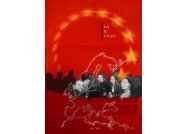turkish-greek civic dialogue - AEGEE Europe
turkish-greek civic dialogue - AEGEE Europe
turkish-greek civic dialogue - AEGEE Europe
You also want an ePaper? Increase the reach of your titles
YUMPU automatically turns print PDFs into web optimized ePapers that Google loves.
52<br />
The role of the NGOs is to bring people together, so they would see each<br />
other and shift from “imaginary other” to “real other”. When people come<br />
together then they will see “the Other”, which does not necessarily to be good.<br />
Not all Turks and Greeks are good; Greeks and Turks are all kinds of people with<br />
all their pros and cons. Human beings with all their merits and weaknesses.<br />
When they meet each other, they will realise that “the Other” is also a normal<br />
person. According to my rough calculations, 100,000 of people go and stay<br />
in the other country for 10 days across and this mobility is a good way to see<br />
the other side. My maximum expectation as an important step is just to<br />
understand “the Other side” is the normal human being.<br />
ALPER AKYÜZ<br />
BILGI UNIVERSITY NGO CENTER<br />
The real problem is not the lack of communication or lack of <strong>dialogue</strong> between<br />
Turkey and Greece. The real problem is the content of the communication<br />
and the content of the <strong>dialogue</strong>. Regarding NGO activities, we face many<br />
problems with bilateral activities such as this gathering here, which is not held<br />
properly thus, which is not healthy at all. In such bilateral activities, there<br />
is always the danger to take sides, especially when participants assume the<br />
role to represent their nations. Such kind of meetings of Greek and Turkish<br />
journalists, Turkish and Greek women, Turkish and Greek local governments,<br />
when two sides really act as if they are sides, this contributes to increase the<br />
negative image of “the Other”. When organising such bilateral meetings, either<br />
the content should be tackled properly or some kind of multilateral context<br />
such as “Mediterranean, Balkan or <strong>Europe</strong>an context” should be used to create<br />
a constructive and open <strong>dialogue</strong> between Turkey and Greece.<br />
HERCULES MILLAS<br />
Once we have an identity of “us and Others”, then we have a problem with<br />
participants of such meetings having another philosophy of dealing with what<br />
we call truth. Every individual supposes and believes that he/she knows the<br />
truth. The truth differs from one person to the other every time. However,<br />
once you understand the things are relative, then you start having doubts<br />
about your own ideas. This creates tolerance. Tolerance is not just standing<br />
and just accepting the Others, it’s accepting the we are human. This is a<br />
new stage, when you’re more doubtful of what you’re saying. Then you say:<br />
“Maybe I’m not right!”<br />
When you see people that are very confident, they believe that they posses the<br />
truth; they start imposing their so-called truth. We can observe this happening<br />
with imperialists, amongst friends, in the international arena. “I know what’s<br />
true, so I’m going to impose this on you”. When we reach to this stage on a<br />
personal basis, then we become more tolerant and societies that are more<br />
tolerant, less authoritative, less depressive are societies that can tolerate<br />
the “otherness”, the difference.<br />
We have problems in the Balkans. We have an understanding of “We’re right,<br />
the Others are wrong!” and we have seen this situation everywhere in Balkans<br />
not only between Greece and Turkey. In Turkey, some people are so confident<br />
that they know what’s good for Turkey, so they impose it and this is lack of<br />
democratic attitude. Sometimes the majority - since they are the majority<br />
- ignores the wish of satisfying the minority and this is a violation of human<br />
rights. This attitude that I name as general lack of democracy comes from the<br />
authoritative understanding of people who believe that they posses the truth.<br />
In order to have a constructive <strong>dialogue</strong>, communication and to overcome the<br />
problems, I think we have to come to a democratic stage. Otherwise, the only<br />
thing we can do is just to negotiate an agreement, negotiate a cease-fire, a<br />
deal; but we won’t solve the deep inside problems and in the next phase, next<br />
crisis, things will start all over again. This is exactly what happened between<br />
Turkey and Greece for the last 3- 4 years. Some desires to solve the problems<br />
and start negotiating. This is not a disastrous approach; however this is not<br />
the point. The real issue is to come to a stage where you respect “the Other<br />
side”, accept “the Other side” with its pros and cons and also stop doubting<br />
about “the Other side”. Self-criticism is a good sign. I’ve met many people<br />
who have doubts about their own rules; still this is difficult change to achieve.<br />
Unfortunately, we do not learn self-criticism in schools and then who’s going to<br />
teach this if the community is lacking this tradition of self-criticism?<br />
Textbooks in the Balkans do not provide the children with multiple<br />
interpretation of the situation. In democratic societies, we have all values<br />
Rebuilding Communication Association des Etats Généraux des Etudiants de L’<strong>Europe</strong>







